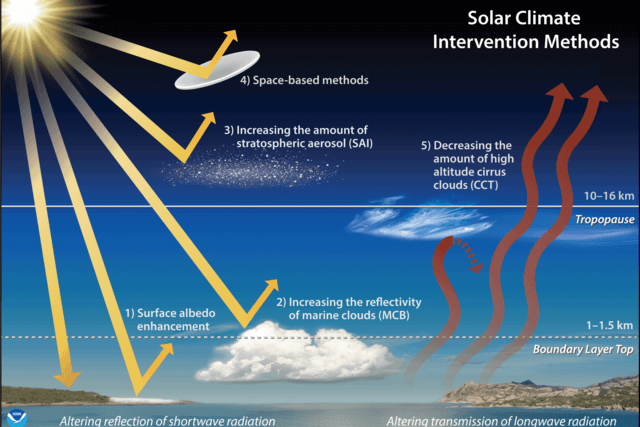
Richard Spinrad, head of the National Oceanic and Atmospheric Administration (NOAA), stresses the urgent need for scientists to delve into the potential impacts of climate geoengineering.
Given the likelihood of its necessity, Spinrad emphasises NOAA’s efforts in assessing various geoengineering techniques, especially those involving ocean interventions.
“My own belief is that we need to get a better understanding of what the impacts are,” he said. “I suspect some aspects of geoengineering are going to be an important component of the solution to reducing global warming, and all of the impacts of global climate change, like ocean acidification.”
Among the strategies under scrutiny are ocean fertilisation, such as seeding with iron to enhance carbon dioxide absorption, and cloud brightening, where water from oceans is sprayed into low-level clouds to reflect solar radiation.
Understanding the repercussions on oceanic ecosystems is paramount, Spinrad asserts.
“If we were to undertake an effort in some things like iron fertilisation [of the oceans], what are the consequence to the ecosystem of doing that? [Also important is] building good predictive models … and supporting decision-makers,” he said.
NOAA’s research focuses on marine carbon dioxide removal, investigating the oceans’ capacity to sequester CO2.
Collaborating with UK institutions and government scientists, NOAA examines the potential ramifications of disruptions to the Gulf Stream, a critical ocean current system.
Recent evidence suggests that the Atlantic Meridional Overturning Circulation (Amoc) is weakening rapidly due to ocean warming and ice melting, posing significant risks to Europe and beyond if it collapses.
Spinrad said: “We should be concerned enough to keep an eye on what the science is telling us. Amoc is not going to shut down tomorrow. But systems like Amoc are inherently noisy. By that I mean, don’t just look at how it’s changed from 2023 to 2024. We need to observe these systems over a long period of time.
“As an oceanographer, I’m concerned enough to say this should be a priority for sustained observations. And I think it’s in the next three to five years we should be getting the best idea of whether we’re seeing a real trend.”
Spinrad defends NOAA’s funding amid concerns from some US lawmakers, highlighting the agency’s $6 billion allocation under President Joe Biden’s Inflation Reduction Act. He underscores the importance of robust climate science in safeguarding US citizens, particularly amid divisive political climates.
“These missions [that NOAA pursues] are not inherently political by any means,” he told a small group of journalists at the US embassy in London. “They are affecting all aspects of security: the traditional interpretations, such as national security, homeland security – but also food security, energy security, water security, economic security. These are not issues that need to be addressed on a political schedule, they are issues that every American citizen, industry and community assumes their taxes will support, regardless of who’s in the administration.”
With wildfires and extreme weather events wreaking havoc nationwide, Spinrad emphasises the growing awareness among Americans about the climate crisis and its impacts.
“They’re certainly feeling it in their pocketbook,” he said. “We’re all paying for the effects of fires that are now hitting. We saw 28 billion-dollar disasters in the US last year, more than we’ve ever seen before. We’re all paying for that. I’m paying for that when I pay my insurance. Consequently, I think the American public is getting it, and understanding it. And that map of billion-dollar disasters, it does not align with the political map in any way.”
——————————————————————————
At Natural World Fund, we are passionate about stopping the decline in our wildlife.
The decline in our wildlife is shocking and frightening. Without much more support, many of the animals we know and love will continue in their decline towards extinction.
When you help to restore a patch of degraded land through rewilding to forests, meadows, or wetlands, you have a massive impact on the biodiversity at a local level. You give animals a home and food that they otherwise would not have had, and it has a positive snowball effect on the food chain.
We are convinced that this is much better for the UK than growing lots of fast-growing coniferous trees, solely to remove carbon, that don’t actually help our animals to thrive.
This is why we stand for restoring nature in the UK through responsible rewilding. For us, it is the right thing to do. Let’s do what’s right for nature!
Donate today at https://naturalworldfund.com/ and join in the solution!

